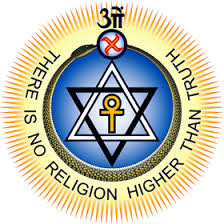Agnishvatta(s)
(Sanskrit) A compound of two words: agni, "fire"; shvatta, "tasted" or "sweetened," from svad, verb-root meaning "to taste" or "to sweeten." Therefore, literally one who has been delighted or sweetened by fire. A class of pitris: our solar ancestors as contrasted with the barhishads, our lunar ancestors.
The kumaras, agnishvattas, and manasaputras are three groups or aspects of the same beings: the kumaras represent the aspect of original spiritual purity untouched by gross elements of matter. The agnishvattas represent the aspect of their connection with the sun or solar spiritual fire. Having tasted or been "sweetened" by the spiritual fire — the fire of intellectuality and spirituality — they have been purified thereby. The manasaputras represent the aspect of intellectuality — the functions of higher intellect.
The agnishvattas and manasaputras are two names for the same class or host of beings, and set forth or signify or represent two different aspects or activities of this one class of beings. Thus, for instance, a man may be said to be a kumara in his spiritual parts, an agnishvatta in his buddhic-manasic parts, and a manasaputra in his purely manasic aspect. Other beings could be called kumaras in their highest aspects, as for instance the beasts, but they are not imbodied agnishvattas or manasaputras.
The agnishvattas are the solar spiritual-intellectual parts of us, and therefore are our inner teachers. In preceding manvantaras, they had completed their evolution in the realms of physical matter, and when the evolution of lower beings had brought these latter to the proper state, the agnishvattas came to the rescue of these who had only the physical "creative fire," thus inspiring and enlightening these lower lunar pitris with spiritual and intellectual energies or "fires."
When this earth's planetary chain shall have reached the end of its seventh round, we, as then having completed the evolutionary course for this planetary chain, will leave this planetary chain as dhyan-chohans, agnishvattas; but the others now trailing along behind us — the present beasts — will be the lunar pitris of the next planetary chain to come.
While it is correct to say that these three names appertain to the same class of beings, nevertheless each name has its own significance in the occult teaching, which is why the three names are used with three distinct meanings. Imagine an unconscious god-spark beginning its evolution in any one solar or maha-manvantara. We may call it a kumara, a being of original spiritual purity, but with a destiny through karmic evolution connected with the realms of matter.
At the other end of the line, at the consummation of the evolution in this maha-manvantara, when the evolving entity has become a fully self-conscious god or divinity, its proper appellation then is agnishvatta, for it has been "sweetened" or purified by means of the working through it of the spiritual fires inherent in itself.
Now then, when such an agnishvatta assumes the role of a bringer of mind or of intellectual light to a lunar pitri which it overshadows and in which a ray from it incarnates, it then, although in its own realm an agnishvatta, functions as a manasaputra or child of mind or mahat. A brief analysis of the compound elements of these three names may be useful.
Kumara is from ku meaning "with difficulty" and mara meaning "mortal." The significance of the word therefore can be paraphrased as "mortal with difficulty," and the meaning usually given to it by Sanskrit scholars as "easily dying" is wholly exoteric and amusing, and doubtless arose from the fact that kumara is a word frequently used for child or boy, everybody knowing that young children "die easily." The idea therefore is that purely spiritual beings, although ultimately destined by evolution to pass through the realms of matter, become mortal, i.e., material, only with difficulty.
Agnishvatta has the meaning stated above, "delighted" or "pleased" or "sweetened," i.e., "purified" by fire — which we may render in two ways: either as the fire of suffering and pain in material existence producing great fiber and strength of character, i.e., spirituality; or, perhaps still better from the standpoint of occultism, as signifying an entity or entities who have become one in essence through evolution with the aethery fire of spirit.
Manasaputra is a compound of two words: manasa, "mental" or "intellectual," from the word manas, "mind," and putra, "son" or "child," therefore a child of the cosmic mind — a "mind-born son" as H. P. Blavatsky phrases it. (See also Pitris, Lunar Pitris)
